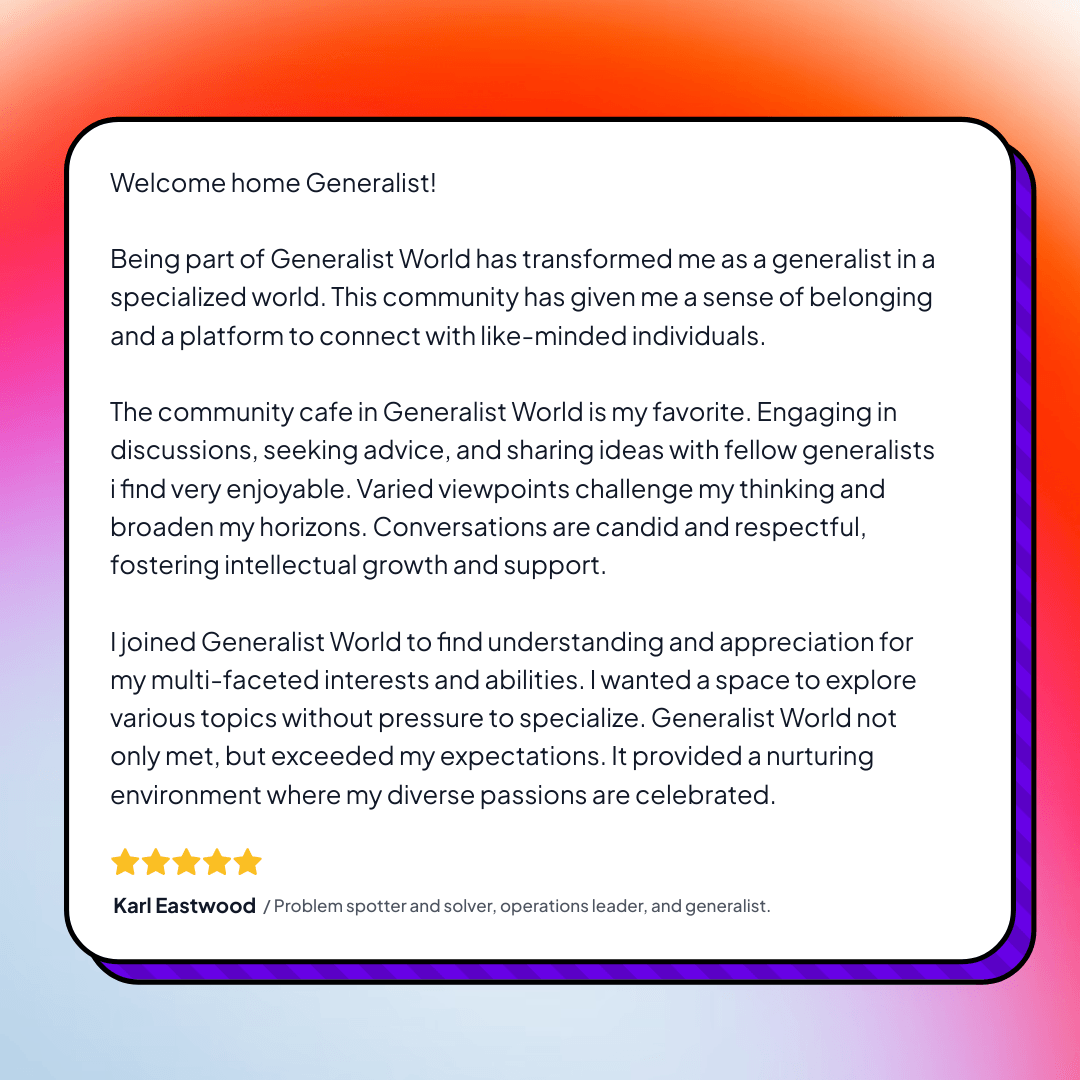
Welcome to today’s edition of In Your Own Words, where we sit down with folks from the Generalist World community and hear more about their journey.
The aim of these pieces is to amplify generalist voices, learn from their ups and downs, and be inspired by successful folks who have forged their own path.
💡 But first, a quick check-in. How's your week going?
Without further ado, meet Michael Tomko. Michael is VP of Technology & Strategy, and has had an impressive career spanning many domains, industries and skillsets. He’s been a fierce supporter of GW and it was a pleasure to dive deeper into his story.
Pour yourself a cuppa, get comfy, and enjoy! ☕️

🎤 In your own words, tell us the story of your career
As far as generalists go, I fall on the extreme end of the spectrum. Because of this, I have always struggled with the word "career." A career has always been oddly wrapped up in one's identity, and I have only sometimes identified myself with the many areas in which I have expertise or am involved in at any given time.
I don't introduce myself as a baseball umpire, despite having done it professionally for 12 years. I have always cringed at calling myself a guitar player, despite touring the country for many years playing guitar in bands — and oddly enough, at almost 40 years old have finally admitted that I prefer playing bass. And, despite 15 years as a software developer, I never felt quite right calling myself that.
The domains of my career have changed wildly and often have been disparate and in parallel, but my role in that shifting landscape has almost always been the same. In every stage of my professional life, I have repeatedly been dispatched to be a change agent. The tools change as frequently as the seasons, but my skills as a communicator, leader, problem-solver, and connector are always at the core of my responsibilities.
I have continuously been brought into situations to be a catalyst, whether that's for change, or that's the spark to get something going.
While I now understand this to be my superpower, I'd be lying if I said it hasn't also brought its fair share of pain. There is no guidebook for living as a generalist; it is also typically foreign and invisible to the specialists around you.
Generalizing can look to others as lazy or unfocused, and internally can feel like ADHD. Boundaries are way less important, which can get you in trouble. People you work with can be frustrated with you for not specializing while conveniently bringing you every odd-shaped problem — this can feel incredibly gaslighting. It's difficult to explain what it can feel like to be able to fit in everywhere but have to change at times yourself to do so — like sharing stories at a dinner party or, the absolute worst, applying for a job.
That said, finding a you-shaped hole in a friend group, significant other, community, or organization can be incredibly satisfying. I find myself in a role today where the stars have aligned. They needed someone with my unique set of skills, are good people, and most importantly, despite knowing how much else I can do, have helped me set healthy boundaries to focus my energy. That payoff is incredible.
As far as what's next. I am finding my niche in product development. Having held VP and C-level roles in product, most would laugh at that statement. But, in a life where no stop on the path has felt final, product development feels like the one thing I have found so far that lets me use my unique set of skills and experiences in totality while still allowing me to continue to grow. Ask me this same question in a few years, and we'll see how far I've strayed from that
👨🏭 Which role has been your favourite, and why?
I recently heard Matt Wallaert provide a great example of an interview question on Melissa Perri's podcast: "tell me about a time when you've changed someone's behaviour?" I love this framing, and in two roles earlier in my life, I learned how to do this. While it may sound ridiculous to say that my time working as a baseball umpire and audio engineer taught me some of the most profound skills and made me a better technology executive, that is true.
My generalist ability to see weird patterns in life helped me develop my umpire persona — even as a youth. Coaches, while notorious for being hot-headed, predominately cared about being informed and calls being fair for both teams. And a large strike zone, especially in a slow-moving game, was the key to keeping things rolling. So, coupling a fairly called but large strike zone with a very loud and consistent persona — everyone near the field knew what the call was and that it was the same for both teams, so there was little to argue with — was the key to achieving both speed and calmness. The exciting byproduct was that this also made the games more fun and elicited a more robust performance from the players. You also would find coaches eventually taking your side and advocating for you with their players.
Parlaying my umpiring experience to working as an audio engineer in recording studios wasn't as big of a stretch as it may sound. Unless you have worked in a studio, few can relate to the plight of an artist being asked to perform in such an unnatural setting. For example, a singer inside a booth, behind multiple panes of glass, wearing headphones, and singing into a big fancy microphone while everyone else watches them, is incredibly challenging, even for the best singers. This was where I first began to understand the concept of psychological safety and how to create that for individuals and teams.
Additionally, having the responsibility to ensure that the performances were properly recorded, I had to develop the skills to remain calm while making swift technical decisions, navigating my client's wants, needs, and emotions, and managing complex projects within tiny windows of time.
These experiences have taught me far more about management and communication than almost anything else that I have done, and I've continued to build on these early lessons. When I think of concepts in product management like ruthless prioritization or incorporating feedback from users, I've had to do that in many capacities throughout my career, even dating back to childhood jobs
🆘 What are some of the challenges you’ve faced as a generalist?
I’ve found in many past positions that it is rare for me to end up doing the job I was hired for. As a generalist, your broad range of skills can get you hired, but then you’re squeezed into a rigid job description — that’s how much of the world thinks, in very specific roles and positions. And then what happens is there’s a drift between the job that you were placed in and the expectations put on you because of how you perform in that job.
Let’s say I’m working on an initiative, and it’s going well, but if I give 5% more effort, I can help clear another department’s blockade. And because generalists can think that way and often act on it naturally, it becomes normal. People don’t even realize they’ve expected this stuff from you, and it’s so unconscious. That can be challenging.
I’ve also found it challenging when leadership wants to fit me in a tidy, orderly box. But then, as soon as a problem arises, I’m the one who gets handed the ball. They know I can pull the right people together and sort out this problem, even if it’s not clearly defined in my box. It can become an incredibly taxing process for the generalist because it’s largely invisible to everybody else.
I’d say the other challenge comes from an identity perspective. Maybe you fall into a company where you’re very well regarded, and people understand your skillset - whether or not they call you the “right term” or they know what you’re good at and reward you for it. But then it’s time to look for another opportunity. And you say, “Look at all these things I’ve done for this organization!” The hiring manager comes back and says, “Well, I’ve looked at the job description, and I just don’t see any of the keywords that this job description has on your resume.” You get caught in the generalist CV trap. And it’s funny because 48 hours earlier, you felt completely well-adjusted and well within your identity. Now all of a sudden, you feel like an idiot; you feel like you don’t know who you are — scattered and a bit lost.
I’m sure many generalists can relate to this part, but the job search opens up every one of my anxieties. This is where the need for community is even more critical. Where you can look around and know: “Okay, I’m not alone here. My path looks different, and that’s what makes me an asset.”
🔮 What do you think the future of work looks like?
Great teams need to be a mix of hyper-specialized people and those who can generalize and see the big picture. You need that balance of both, and when you sway too much in either direction, you can either become too focused or too unfocused.
Where technology is going, I see much of what I’d call a ‘race to the middle.’ Everybody’s cannibalizing each other, and they’re not actually taking big risks. They’re basically trying to say, “I’m going to recreate the same thing somebody else has, and I hope I win out on one point or another.”
This reminds me of one of my favourite The Long Winters’ lyrics — “Are you still training for the big race / by hoping the runners will die?”
I think if novelty actually can become something that drives investment again, then you’re going to need more generalists on your team who are not hyper-focused because that hyper-focus will lead to that ‘race to the middle.’ I’ve found that it’s rare for me to end up doing the job I was hired for. As a generalist, your broad range of skills get clocked, and then they tried to get squeeze them into a rigid job description. And then what happens is there's a drift between the job that you have that you're placed in and the expectations put on you because of how you perform in that job.
💭 Closing thoughts
I was a software developer for 15 years, but I never learned more than the problem I had in front of me. I think what makes generalists powerful is that they can chameleon into things and talk authoritatively about a lot of different topics, connect with people from all walks of life, and spot patterns where others don’t.
Meet Michael, and hundreds of others like him, in the Generalist World community. Our member testimonials do the talking (click to read more)


About Michael: Multi-faceted technology executive with a 15+ year track record of driving innovation, product strategy, and digital transformation while yielding substantial cost, productivity, and company culture improvements. Hands-on problem-solver passionate about connecting people and technologies to break down barriers, foster collaboration, develop cross-functional strategies, and further technological evolution. Michael is currently VP of Technology & Strategy at Watchtower Security in St. Louis, MO.
